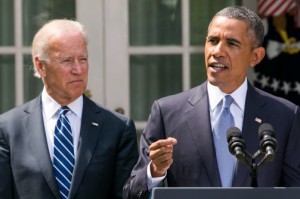 I agree with President Obama. Now, get up off the floor and read the rest. I know the first sentence was a shock to your system, but it is a limited agreement with all kinds of cautions. On what do we agree? His decision to turn to Congress to debate what action should or should not be taken in Syria was the correct decision. I have no illusions as to why he finally decided to do so—it had far more to do with public opinion and lack of support from other countries than from any constitutional scruples of his own. But I’ll take what we can get.
I agree with President Obama. Now, get up off the floor and read the rest. I know the first sentence was a shock to your system, but it is a limited agreement with all kinds of cautions. On what do we agree? His decision to turn to Congress to debate what action should or should not be taken in Syria was the correct decision. I have no illusions as to why he finally decided to do so—it had far more to do with public opinion and lack of support from other countries than from any constitutional scruples of his own. But I’ll take what we can get.
Only the Congress can declare a war. I realize that’s rather quaint to say nowadays, but it’s still the truth—at least if we seek to abide by even a shred of the concept of rule of law anymore. I’m glad Congress is going to take up the issue when it returns on September 9; my hope is that, after the debate, we will not commit any military to this theater of action. My reason? There is no side to support. One side uses chemical weapons against the other and is an ally of Iran, while the other commits atrocities of its own, particularly on the Christian community. It does so primarily because Al Qaeda is part of the rebel coalition. As I stated in a previous post, it would be unconscionable to provide military aid to any movement associated with that terrorist organization. I also believe that if the opposition should win, Syria won’t be a better place, and it certainly could get demonstrably worse.
There’s another facet of this as well. If the Congress should do as I have outlined, Obama may disregard the vote and go ahead with military strikes anyway. His administration has concluded it can act unilaterally, and cites the War Powers Act for authorization. I fully agree that, if attacked, or if America or American citizens are in imminent danger, the president can move forward without a protracted debate first. But those are worst-case scenarios. Neither can the War Powers Act go contrary to the Constitution, regardless of the rationalizations used by supporters of taking action.
Some may cite what Ronald Reagan did in the 1980s as a similar situation. Again, I disagree. Reagan used the military in two specific instances: Grenada and Libya. Here are the differences.
 First, in Grenada, a radical Marxist government took over, Cubans were employed to build a runway for aircraft, and the island would have become another outpost for the Soviets in the Western Hemisphere. The other islands nearby were frightened by this prospect and asked America for help. In addition, there were American citizens on the island, medical students, whose lives were endangered by this takeover. Reagan moved swiftly and without congressional debate primarily because if he hadn’t, those students would undoubtedly have been used as hostages and/or human shields. He did consult with congressional leaders from both parties before acting, but he couldn’t afford to wait until Congress had aired everything. A public debate would have allowed time for the Soviet allies to prepare. When those students returned home, he welcomed them to the White House. They were exuberant that their nation had put their safety first.
First, in Grenada, a radical Marxist government took over, Cubans were employed to build a runway for aircraft, and the island would have become another outpost for the Soviets in the Western Hemisphere. The other islands nearby were frightened by this prospect and asked America for help. In addition, there were American citizens on the island, medical students, whose lives were endangered by this takeover. Reagan moved swiftly and without congressional debate primarily because if he hadn’t, those students would undoubtedly have been used as hostages and/or human shields. He did consult with congressional leaders from both parties before acting, but he couldn’t afford to wait until Congress had aired everything. A public debate would have allowed time for the Soviet allies to prepare. When those students returned home, he welcomed them to the White House. They were exuberant that their nation had put their safety first.
In 1985, a disco in West Berlin was the target for a terrorist attack, bombs killing and wounding many, including American soldiers stationed in that city. The investigation led back to Qaddafi in Libya. This was a direct attack on Americans, and Reagan responded with a military strike on specified targets within that country. He also hoped he could take out Qaddafi as well. While the latter objective wasn’t achieved, Qaddafi’s direct involvement in terrorism lessened from that day forward.
Today, in Syria, while events on the ground are horrific, and even though in a general sense what happens in the Middle East will affect us, no Americans are in imminent danger and, as I have already stated, there is no one to support. All options are lose-lose. For those reasons, I am not in favor of using our military in this situation. But above all, I am opposed to the president simply doing whatever he wishes in disregard of the Constitution.
So, President Obama has done one thing right. Now it’s Congress’s turn to do what is right. If Congress does so, Obama must then abide by that decision. I have no illusions that he will do so because it is the right thing to do, but I’m hopeful there will too much pressure on him to do otherwise.
